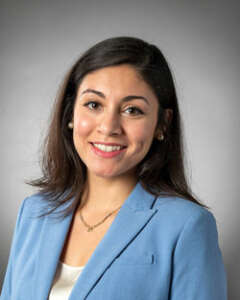Working from home has presented many challenges for staff, faculty, and students at the University of Notre Dame. As everyone has adjusted to a virtual work style in addition to new family schedules, the Notre Dame Research team is among those who have had to find ways to connect and adapt.
For Jasmine Botello and Sugana Chawla at the Center for Network and Data Science (CNDS), this has meant not only a transition in the kind of work they are doing, but also changes what it means for them to be single-parents.

“There has definitely been a change in the work-life balance since the University asked employees to work from home,” said Botello, administrative assistant at the CNDS. “I think many of us are trying to keep our kids educated and entertained as well as making sure we are meeting the new challenges of supporting research virtually.”
Before the coronavirus pandemic, Botello had already begun spending some of her time on a project with CNDS Director Nitesh Chawla to study early childhood development and to fight child malnutrition in Mexico. Working with the organization Un Kilo de Ayuda (UKA), CNDS team is using artificial intelligence to develop models and system to track progress of and improve child health.
Originally this research required a trip to Mexico City in March to survey social workers and families working with UKA. Botello is finishing up her master’s degree in communication and was planning to utilize health communication theory to support the research, as well as act as a translator for the project, since she speaks both Spanish and English. Although the trip had to be postponed, the research continued with virtual conversations and collaborations with Attina Zhang, undergraduate majoring in applied and computational mathematics and statistics and sociology and also a Kellogg International Scholar, and Jennifer Schnur, graduate student pursuing a doctoral degree in computer science and engineering.
Overall, the shift to working at home increased the demand of the work, since so much had to be adjusted for virtual participation, but also improved the attention and time Botello was able to apply to the research.
“Establishing a consistent work schedule right now is tough, given everyone’s new normal, so the flexibility from my collaborators in Mexico and co-workers at Notre Dame has been indispensable. Everyone has been on board with making whatever we can work, which has meant better availability and more involvement from me,” said Botello. “So even though there is a downside, I’ve been able to get more involved in other aspects of the research, like helping analyze how we can improve our interview process. I’m so grateful to be on a team that allows that, and am proud of what we have been able to accomplish.”

For Sugana Chawla, working from home threw a wrench into her launch plans of the Interdisciplinary Traineeship for Socially Responsible and Engaged Data Scientists (iTREDS) program. As program coordinator of iTREDS, Sugana was charged with program coordination, including supporting recruitment and planning a town hall for the students accepted into the new program. When it became clear the event would need to be moved online, the iTREDS team had to find ways to foster this community of students while ensuring general instruction could still be relayed effectively. This was especially difficult as the event fell in mid-May, while many students had other obligations, like moving out of dorms at other universities, that were unique to the pandemic.
“Launching a program is complicated enough when you’re doing things for the first time, but working through the challenges of taking care of my daughter while she isn’t in school as well as having to change our original meeting plans was difficult,” said Sugana. “Not to mention I wanted to make sure that even though everything was moving online, the students still felt excitement about being a part of the program. I am so grateful to all the iTREDS faculty for their collaboration to make this happen, and a special shout out to Ron Metoyer and David Hachen, my supervisors, for their support. Collaborating with Jasmine and the CNDS team also really helped.”
Dealing with a virtual world presented several hurdles that Sugana overcame with the support of the CNDS. Sugana was scheduling weekly conversations with the iTREDS scholars to discuss any questions or concerns they had, both pandemic and non-pandemic related, and weekly meetings for iTREDS faculty who each had various needs.
“Everyone across campus has had to deal with the new normal of our work environment, and team members like Jasmine and Sugana have been critical for the success in this transition and the continuation of research and scholarship at the CNDS, as it takes a village,” said Nitesh Chawla.
To learn more about CNDS, please visit https://cnds.nd.edu/.
Contact:
Brandi Wampler / Research Communications Specialist
Notre Dame Research / University of Notre Dame
brandiwampler@nd.edu / 574.631.8183
research.nd.edu / @UNDResearch
About Notre Dame Research:
The University of Notre Dame is a private research and teaching university inspired by its Catholic mission. Located in South Bend, Indiana, its researchers are advancing human understanding through research, scholarship, education, and creative endeavor in order to be a repository for knowledge and a powerful means for doing good in the world. For more information, please see research.nd.edu or @UNDResearch.
